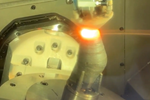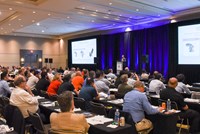EU Commits to Additive Manufacturing Industrialization at AMEC
This year's Additive Manufacturing European Conference (AMEC) emphasized fiscal and R&D incentives, standardization efforts, legislation related to AM.
Share
Read Next
The Additive Manufacturing European Conference (AMEC), which took place June 21, 2018, emphasized the need for fiscal and R&D incentives, standardization efforts and caution before legislating to speed up AM deployment in Europe.
Organized by CECIMO and co-hosted by Members of European Parliament (MEPs), AMEC helped to secure commitments of EU decision makers on the strategic importance of additive technologies for the European industrial economy. According to organizers, this was visible in pledges to promote new investments, develop standards and avoid over-regulation that MEPs and officials from the European Commission, the executive arm of the EU.
Discussions with industrialists and AM professionals covered best measures to accelerate the uptake of additive manufacturing and the growing range of the technology’s applications in European industry. Key examples came from the aerospace, medical, automotive and hydraulics sectors, where the benefits of additive solutions are being increasingly recognized.
When kicking off the event, Stewart Lane, the general manager of the UK Sales Division at Renishaw and chair of the CECIMO Additive Manufacturing Working Group, called on policymakers to embrace a forward-looking vision for industry in Europe. He emphasized that ‘’It’s important to apply caution in introducing legislation in a growing sector like additive manufacturing. We need to keep supportive framework conditions.’’
MEP Ivan Stefanec (EPP) commented on the importance of backing SMEs in the adoption of additive manufacturing technologies. According to the MEP, taking a cautious approach to regulation is instrumental to achieve that. ‘’We need to avoid hindering innovation,’’ he said about the topic. Stefanec went on also underlining the importance of EU’s support to research activities. ‘’Estimates say 3D printing may have an impact of up to $550 billion a year by 2025. I do believe it is very important the EU supports industry’s research activities,’’ he said.
MEP Dita Charanzová (ALDE) highlighted the relevance of EU work on standardization. Designing solid Europe-wide standards first, and seeking their successful international adoption later, would go a long way to help European industry in moving towards new additive production methods, she said. However, Charanzová also sounded the alarm on the lack of relevant skills to foster the technology uptake across the EU: ‘’We will need to start wholly new educational programs to create the relevant workforce,’’ she commented.
MEP Mady Delvaux-Stehres (S&D) spoke about the existing IPR and liability framework on additive manufacturing in Europe, linking it to recent European Parliament’s initiatives. Stressing that industrial and consumer spaces must clearly differentiated, Delvaux-Stehres reassured the audience about the cautious approach towards regulation that legal affairs policy-makers have in the Parliament. ‘’I believe the existing framework can fit for 3D printing,’’ she stated while addressing product liability rules in the EU.
The conference was moderated by Frits Feenstra from TNO and Benjamin Denayer from Sirris.
Related Content
-
PowderCleanse Concept Delivers In Situ Powder Analysis for Metal 3D Printing
A collaborative project developed a prototype solution for measuring particle size distribution on the production floor, as part of the sieving step typical to additive manufacturing processes using metal powders.
-
Plastics Assembly Expert Joins Development and Production via 3D Printing
Manufacturing technology supplier Extol has always served customers who are producing polymer parts. Now, it is making some of those parts in-house through 3D printing, providing new options ranging from functional prototyping into bridge production and beyond.
-
Titanium Golf Club Line Leverages AM to Boost Clubhead Performance
Japanese lifestyle golf brand Designer utilizes Farsoon 3D printing to optimize the design and production of its latest titanium golf club line.














